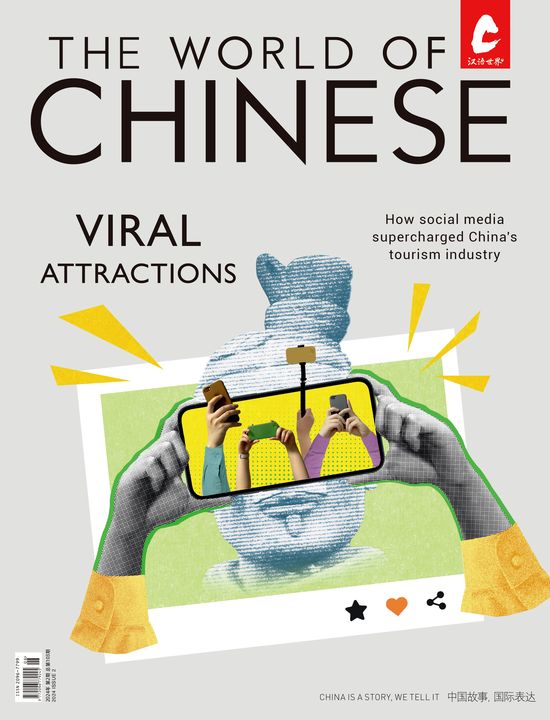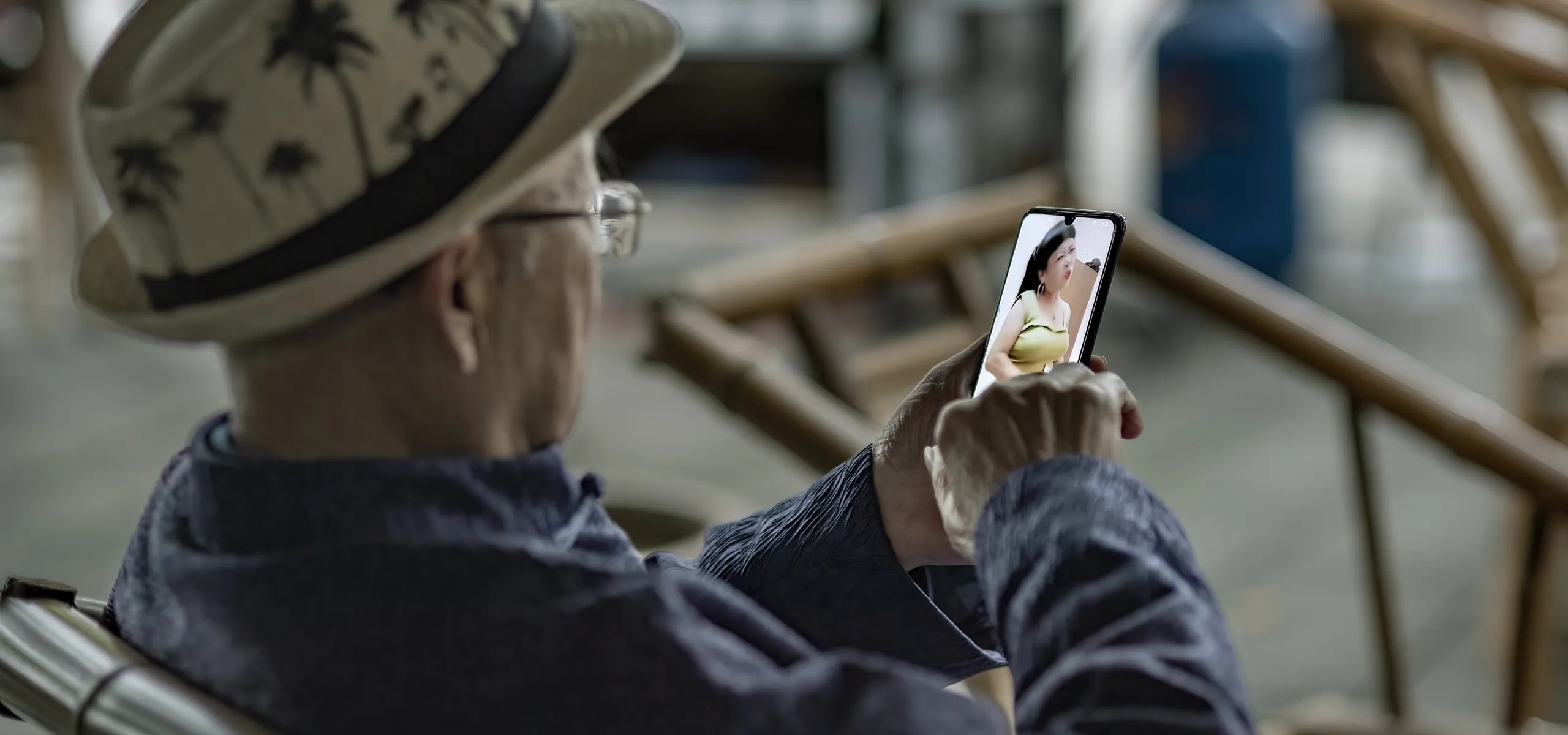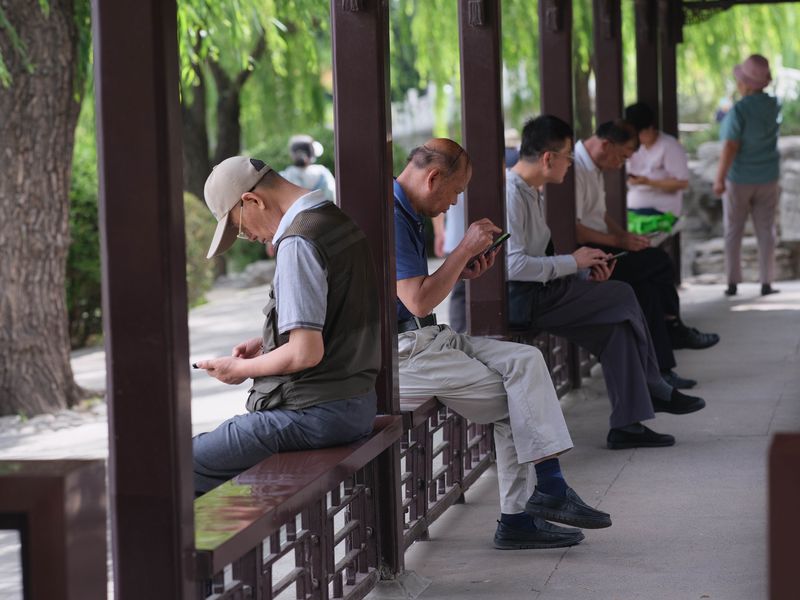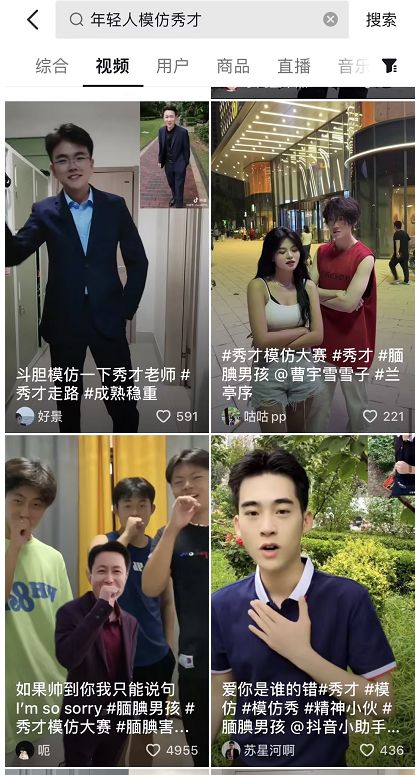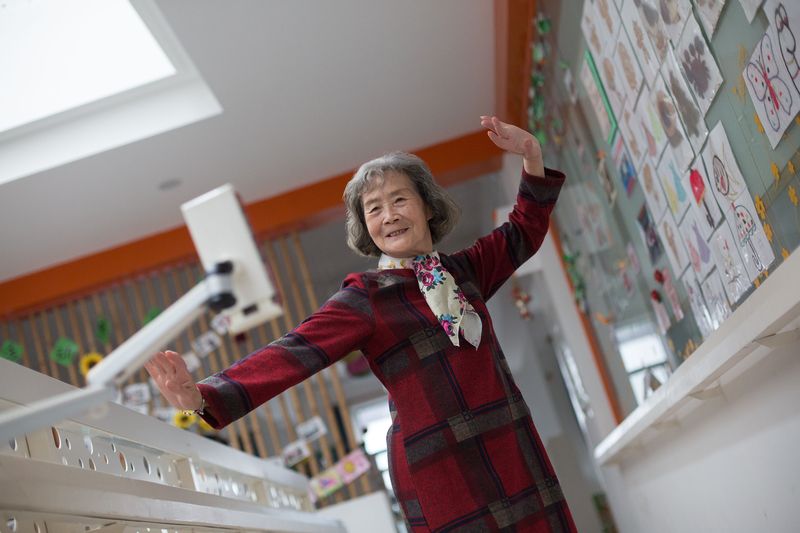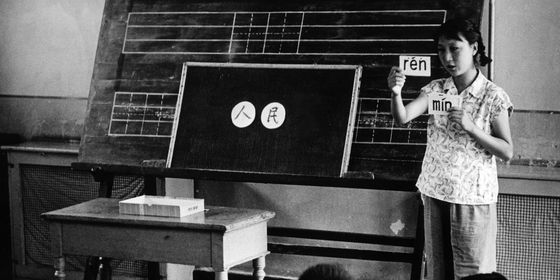The suspension of a short video channel throws the spotlight on how influencers attract elderly users and the risks seniors face online
Z hang Jian, a 62-year-old farmer in Anhui province, was devastated when he heard that Yixiaoqingcheng, his favorite influencer on Douyin (China’s version of TikTok), announced a temporary hiatus from social media due to family issues on August 24. For the past three years, visiting Yixiaoqingcheng’s channel has been a daily ritual for Zhang.
“After a long day in the field, all I want to do is watch her smile while she dances and sings,” he tells TWOC.
After working in factories, on construction sites, and as a security guard in Shanghai, Nanjing in Jiangsu province, and Wenzhou, Zhejiang province, Zhang returned home to pursue farming due to a lack of job opportunities in those cities. That’s when he came across the charismatic 31-year-old social media personality Yixiaoqingcheng, which literally translates to “the smile that charms a city.” Yixiaoqingcheng, or Xiaoxiao as her followers lovingly call her, has amassed about 20 million followers with thousands of videos of her singing and dancing.
She has become a comforting presence for Zhang. “Xiaoxiao is a part of my life now. I tell her many things and she never gets annoyed at me,” Zhang tells TWOC.
To better support his favorite influencer, Zhang often calls his granddaughter via video chat and asks her to teach him how to get access to Yixiaoqingcheng’s livestream session and leave “likes” and comments. He enjoys Xiaoxiao’s girl-next-door vibe and watches her every video on Douyin. When Xiaoxiao stopped updating her social media in August, Zhang felt an emptiness in his life, he tells TWOC.
Many find Yixiaoqingcheng’s hiatus from social media suspiciously timed considering the recent closure of a similar Douyin influencer account—Xiucai. This popular account stopped livestreaming on August 20 and was temporarily suspended by the platform on September 2 due to alleged tax evasion.
Born in the 1980s, Xiucai had over 12 million followers on Douyin, with most of them middle-aged or elderly, before his account was suspended. In just three years, he won their hearts through cheeky smiles and lip-synch performances of old classic songs filmed against picturesque countryside backdrops. Xiucai often encouraged his followers to “duet” with him in videos—a function on Douyin that allows users to post their video side-by-side with a video from another creator. These duet videos have become immensely popular among his senior followers, with a related hashtag on Douyin gaining over 660 million views.
Liu Yinhua, a grandmother in her 60s from Hunan province, is one of Xiucai’s fans. “My sister-in-law and I made a video with Xiucai for fun last July, and he didn’t get annoyed during the process. So later I started to watch his videos every day. For elderly people, it’s beneficial for our health to have something to do, like shooting videos, as we have a lot of free time,” says Liu. (She doesn’t seem to understand that the Xiucai in her duet video is not actually shooting the clip with her in real-time.)
Liu treats the influencer as a friend. Out of over 1,000 videos Liu posted on Douyin of her life in rural Hunan, dozens are about her singing songs with Xiucai since last July. “When I was at home with nothing to do, I just wanted to watch his videos,” she says.
According to Daduoduo, a data analysis platform for Douyin, over 64 percent of Xiucai’s followers are aged over 50, and over 62 percent of them are from smaller “third-tier” cities or lower. His channel has become a virtual haven filled both with laughter and sorrows from left-behind wives, lonely elders, and middle-aged divorcees. They would share stories of their life, from their grandchildren falling sick, to their excitement about their children’s weddings, by leaving comments on Xiucai’s videos. Some would also simply praise him for his appearance and talent, calling him “handsome.”
Xiucai and Yixiaoqingcheng, along with other similar influencers, have emerged as leaders in a growing wave of social media personalities targeting the middle-aged and senior populations. According to a report by the China Internet Network Information Center, nearly 300 million netizens are now over the age of 50, accounting for approximately 30 percent of the total internet user base. Users aged over 60 have created more than 600 million short videos on Douyin alone as of April 2021, based on a study by the Population Development Studies Center of Renmin University. Meanwhile, China’s over-60s population is expected to reach 402 million in 2040. With more free time and disposable income, the monetization potential of this demographic has become increasingly appealing to businesses and influencers.
According to Jimu News, a 62-year-old woman from Beijing sent Xiucai approximately 520,000 yuan worth of virtual gifts between October and December 2020. The top five spenders on Xiucai’s channel have each spent at least 100,000 yuan during his livestream sessions, according to a report from the finance news platform Xin Caijing. The report also shows that the number one supporter of Yixiaoqingcheng has spent at least 20 million yuan on the influencer. Many suspected that this flood of “gifting” may have played a role in Xiucai being reported to the authorities and Yixiaoqingcheng going radio silent to wait out the storm.
Even though most elderly people have a poor understanding of algorithms, it doesn’t interfere with their usage of short video platforms, as Professor He Zhiwu of Huazhong University of Science and Technology pointed out in a study this August. All they need to do is “like” or repeatedly watch the video they enjoy and swipe away the things they’re not interested in. The platform will learn their preferences and provide them with an endless supply of similar content. These short video platforms, like Douyin and Kuaishou, and influencers, like Xiucai and Yixiaoqingcheng, have in turn become a source of solace and companionship for the age group.
Ren Xing, a music teacher in her 30s, was shocked when she first found out this August that her technologically challenged grandma, now in her 70s, had been following Xiucai since early 2021. But she soon understood the logic behind her grandma’s fascination. “Most of [the elderly] have been trapped in a loveless marriage since they were young, and as they grew older, they couldn’t keep up with the times. With most of them burdened by life, they tend to seek out emotional solace online. Men look for sweet girls, and women look for gentlemen,” says Ren, who agreed to be interviewed under a pseudonym.
Even though Ren doesn’t fully understand the allure of Xiucai, she admits that the influencer appears kind and considerate, even a bit shy at times—completely different from her grandmother’s ill-tempered husband. “Most women weren’t treated well in the past so I can understand why aunties and grandmas are drawn to [Xiucai],” she says.
Being online doesn’t shield the elderly from abuse, however. Ren’s grandmother, who shares videos of herself dancing, singing, and wearing pretty dresses on Douyin, sometimes receives unfriendly and explicit comments from middle-aged and elderly men. “Some sent my grandma messages saying something like ‘Come spend life with me,’ making her really suspicious about any male followers. She doesn’t reply to these kinds of comments anymore, because you don’t know if a polite ‘Thank you’ would be treated as an invitation for harassment,” says Ren.
The emotional support that elders find from influencers has also become a source of mockery and pranks among young people. Some, including primary school students, who considered Xiucai’s performances cheesy, have started a new trend of imitating the influencer and humorously recreating his “shy and embarrassed” expressions in different scenarios, such as meeting students and their parents as Xiucai in supermarkets, or pretending to be Xiucai discovering expensive items after scrutinizing labels in a shop. These spoof videos have gained over 300,000 views online.
Some would even impersonate middle-aged users and leave sarcastic and sometimes explicit comments under Xiucai or Yixiaoqingcheng’s videos. A female user under the handle Pingdanshizhen, who seems to be in her 50s, often posts her duet videos with Xiucai on Douyin. Under her videos, some (apparently younger) users have left comments like “Being too lecherous can only do you harm.” She is so bothered by these comments that she had to later write a disclaimer on her homepage: “I come from a rural village. I don’t have any other ways of entertainment. It’s only through Douyin that I get to meet you guys. Please don’t make irresponsible comments on my channel.”
Ren believes this behavior from youngsters is the result of misunderstanding. “Young people don’t understand why elderly people express themselves so boldly, which is different from how they usually see them. But in fact, old people are just trying to express their love [for the influencer],” Ren tells TWOC.
An article from Chongqing Shangyou News this month pointed out that the reason young people tease the elderly for these unconventional actions is that they don’t usually see them as individual human beings with desires and emotional needs. Instead, they often view the group as housewives or caregivers for their children who are now deviating from their supposed societal roles. While it’s normal for young people to become avid fans of pop idols, when old people start to splurge on their favorite influencers, it may be considered problematic, creating tension within the family.
In March of last year, a girl voiced her dissatisfaction online when her mother spent 800 yuan on a coffee machine endorsed by her idol, Deng Lun, and continued to spend money voting for Deng in competitions on the Twitter-like platform Weibo. The daughter thought her mother’s actions went too far, despite her mother earning her own money to support her favorite idol. This incident sparked heated public debates on whether children should interfere with their parents’ spending on their idols.
Wang Yufen, a 72-year-old retired teacher, took her fandom for Xiucai to new heights when she traveled 1,700 kilometers alone from Jilin province to Anhui province this May for a chance to meet him in person. “Why can’t someone in her 70s meet online friends?“ asked Wang as people questioned her actions. Unfortunately, her dream of meeting Xiucai didn’t come true, as local authorities tasked with helping homeless people sent her back at the request of her family the day after her arrival.
Many also worry that elderly social media users make easier targets for scammers who prey on their affection for influencers.
Cases of fraud targeting the emotional needs of senior citizens are on the rise. In 2020, 60-year-old Huang Yue was tricked into eloping from Ganzou city of Jiangxi province to Jilin’s Changchun by someone pretending to be the famous actor Jin Dong. The con man claimed that he would marry her and give her 1 million yuan and a house worth 600,000 yuan. Last September, another elderly female fan of Jin Dong transferred 200,000 yuan to someone pretending to be the actor.
In both these cases, a social media account purporting to be Jin Dong would approach the victims through private messages, and ask about their lives and worries in order to build an emotional bond with them. Then, they would start asking for what they termed investment, charitable donations, and gifts.
Yun Yi, a college student from Zhejiang province, introduced her father to Yixiaoqingcheng this August. She later found that he had started watching the female influencer’s channel almost every day. But she isn’t too bothered about her father becoming obsessed. “I think as my parents earn their own money, then they have the right to decide how to spend it. What we sons and daughters need to do is to show more support, and I believe my parents will pursue celebrities rationally without having a negative impact on our family life.”
To address the growing concerns about potential scams on elders, short video platforms including Douyin declared this August that they would try to prevent online fraud targeting elderly people via pop-up window notifications, safety verifications, AI voice notifications, as well as daily spending limits on virtual gifts.
Zhang Jian, however, is just hoping that Yixiaoqingcheng will come back online soon. In the meantime, he is learning from his granddaughter how to buy virtual gifts and send them to Xiaoxiao once she’s back. “I just want to show my support,” he says.
How China’s Seniors Got Hooked on Short Video Influencers is a story from our issue, “Online Odyssey.” To read the entire issue, become a subscriber and receive the full magazine.
